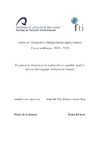Please use this identifier to cite or link to this item:
https://accedacris.ulpgc.es/jspui/handle/10553/73757
| Title: | El género no binario en la traducción al español: análisis del uso del lenguaje inclusivo no binario | Authors: | López León, Carla | Director: | Álvarez Pérez, Beneharo | UNESCO Clasification: | 570113 Lingüística aplicada a la traducción e interpretación | Keywords: | Género no binario Traducción LGBT Traducción feminista Lenguaje inclusivo no binario Estrategias de traducción, et al |
Issue Date: | 2020 | Abstract: | En la actualidad, la expresión de la identidad de género se ha convertido en un tema candente y gracias a la nueva y cada vez mayor visibilidad de las diferentes realidades que comprende esta cuestión, entre ellas, los géneros no binarios, han comenzado a surgir paulatinamente discusiones con respecto al uso del lenguaje inclusivo. El colectivo LGBT aboga por el uso de un lenguaje sin carga de género cuando se desconoce el género o identidad de género del individuo en cuestión; sin embargo, esto suscita un problema si se tiene en cuenta que, en español, el inclusivo será el género masculino y que todas las palabras y pronombres tienen género, ya sea masculino o femenino. Por tanto, este Trabajo de Final de Grado aborda el uso del lenguaje inclusivo no binario en traducciones del inglés al español donde se manifiesta este tipo de lenguaje en el texto original. Para llevar a cabo el estudio, se realiza un cuestionario a los estudiantes de tercer y cuarto año del grado en Traducción e Interpretación de la Universidad de Las Palmas de Gran Canaria en el que responden a unas preguntas previas y posteriores a la traducción de un texto no binario en inglés que ellos mismos llevan a cabo. A partir de sus respuestas, se analiza el uso del lenguaje inclusivo no binario y los motivos que los han llevado a tomar tales decisiones de traducción.
Los resultados del análisis del cuestionario y las propuestas de traducción muestran que, a pesar de la inexperiencia al tratar con este tipo de textos, la decisión de traducción más reiterada es hacer uso del lenguaje inclusivo no binario y que el entorno y conocimientos previos del traductor sobre este ámbito han influido en sus decisiones, y, por tanto, en la producción del texto meta. Today, the expression of gender identity has become a hot topic and thanks to the new increasing visibility of the different realities that gender identity comprises, including non-binary genders, discussions on the use of inclusive language have gradually begun to arise. The LGBT community stands for the use of a gender-free language when the person’s gender identity remains unknown. However, this presents a problem since in Spanish the inclusive gender is masculine and every word and pronoun is gendered, either masculine or feminine. Therefore, the aim of this End of Degree Project is to address the use of inclusive non-binary language in translations from English into Spanish where this type of language was used in the original text. To achieve this, third and last year students from the degree on Translation and Interpeting of the University of Las Palmas de Gran Canaria completed a survey in which they answered questions regarding issues from the pre- and post-translation process of a non-binary text written in English. Based on their answers, the use of inclusive non-binary language and the reasons that led them to take such translation decisions were analyzed. The survey results and the different translations show that despite the inexperience when dealing with this kind of texts, the most repeated translation decision was to make use of inclusive non-binary language and that the translator’s environment and prior knowledge on the matter have an impact on their decisions, and therefore, on the target text. |
Department: | Departamento de Filología Moderna, Traducción E Interpretación | Faculty: | Facultad de Traducción e Interpretación | Degree: | Grado en Traducción e Interpretación: Inglés-Francés | URI: | https://accedacris.ulpgc.es/handle/10553/73757 |
| Appears in Collections: | Trabajo final de grado |
En el caso de que no encuentre el documento puede ser debido a que el centro o las/os autoras/es no autorizan su publicación. Si tiene verdadero interés en el contenido del mismo, puede dirigirse al director/a o directores/as del trabajo cuyos datos encontrará más arriba.
Show full item recordPage view(s) 1
4,562
checked on Jan 11, 2026
Download(s)
15,352
checked on Jan 11, 2026
Google ScholarTM
Check
Share
Export metadata
Items in accedaCRIS are protected by copyright, with all rights reserved, unless otherwise indicated.
